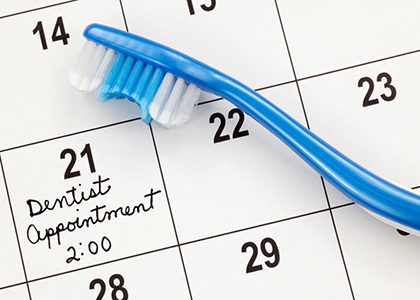The Process of Dental Fillings: Brief and Understandable
Dental filling is one of the most common dental procedures. It's mainly necessary for cavities but has its advantages and disadvantages.
When is Dental Filling Necessary?
Dental fillings are mostly required in the case of tooth decay. The process leads to the leaching of minerals from tooth tissues, eventually penetrating the deeper tissues and damaging the dental pulp. To restore the formed cavity and prevent further complications, a dental filling is needed. Less commonly, the procedure is also used for discolored or worn tooth necks.
Step-by-Step Filling Procedure
Most are aware that drilling is necessary during a dental filling. But what exactly are the steps involved? Here's how it goes:
Step 1: Condition Assessment
As with most dental treatments, the first step in a dental filling is to assess the condition. The professional examines how advanced the decay is.
Step 2: Local Anesthesia
The entire procedure takes place under local anesthesia, making the often-dreaded dental filling painless. Your dentist will numb the affected tooth and surrounding area.
Step 3: Drilling
Once the area feels sufficiently numb, the drilling begins. This step involves the complete removal of the decayed area, i.e., the dead tissues.
Step 4: Disinfection
The next step involves disinfecting the tooth cavity, removing bacteria and other residues.
Step 5: Preparing for Filling
Your dentist then prepares your tooth for the filling. This ensures that the filling material properly adheres and remains durable. This process involves a special UV-light curing adhesive.
Step 6: Applying the Filling
The next step is placing the filling. The composite material is gradually added to the cavity and cured with UV light.
Step 7: Adjustment
Finally, your dentist adjusts the filling to ensure comfort and seamless biting. This involves biting down on a special thin paper, which helps achieve perfect contact between the teeth and the correct height of the filling.
Is Pain Normal After a Filling?
Feeling some pain after a dental filling is somewhat normal. Natural discomfort may occur as the anesthesia wears off. Trained dentists inform their patients about expected symptoms post-procedure and how to alleviate pain. For a few days, not only the affected tooth but also the surrounding gums and adjacent teeth might be sensitive.
Costs of Dental Fillings
The cost of dental fillings varies by clinic, but you should expect to spend approximately 25,000 to 50,000 HUF per tooth. At Fehérvári Dental, neck fillings are priced at 15,000 HUF per tooth, while aesthetic fillings cost 19,500 HUF per tooth.
Common Questions and Answers
Eating After Filling: How Long Should You Wait?
It's not recommended to eat immediately after a filling. The waiting time depends on whether the procedure used local anesthesia and the curing time of the filling material. Typically, it's wise to wait 2-4 hours.
What is a Temporary Filling?
A temporary filling is usually placed between two treatments for a short period to protect the sensitive interior of the tooth until the permanent filling is applied.
How Long Does Pain Last After a Filling?
It's normal to experience pain for a few days after a filling. Not only the treated tooth but also the neighboring teeth can be sensitive. Sensitivity to hot, cold, or hard foods can last up to 1-1.5 weeks.
Why Avoid DIY Fillings?
Today, various home dental solutions are available, but they are far from safe. DIY fillings can cause permanent damage to teeth, so they are not recommended.
How to Manage Pain After a Filling?
There are several options for alleviating post-filling pain. Your dentist will surely inform you about suitable pain relief medications. You can also use cold compresses, special toothpaste, or mouthwash.
Is the Filling Visible from the Front?
Nowadays, aesthetic fillings that perfectly match the natural color of the teeth and are not noticeable are commonly used.
What to Do if a Filling Falls Out?
If a filling falls out, it's crucial to visit your dentist. It often happens during eating, so be mindful of the risk of swallowing. It's not necessary to keep the fallen filling, as a new one will be needed.
Is Post-Filling Sensitivity Normal?
Yes, it's normal to have sensitive teeth after a filling. This can last up to two weeks. Avoiding overly hot, cold, or hard foods can help ease the discomfort.
Is Filling Painful?
Many wonder if filling is painful. No need to worry! Dental filling is a painless procedure due to local anesthesia.
Signs of a High Filling
Signs of a high filling include unusual biting, a misaligned dental arch, and protruding filling. In these cases, it's necessary to revisit the dental office for adjustment through polishing.
How to Prevent a Filling from Falling Out?
Over time, old fillings can loosen and fall out. It's wise to undergo routine check-ups every 6-8 months to ensure fillings are in good condition.
Is Filling Possible During Pregnancy?
Yes, dental fillings are possible during pregnancy. To avoid further inflammation, it's advisable to perform the treatment as soon as possible. It's best scheduled during the second trimester.
Is Smoking Post-Filling Allowed?
As long as any part of the mouth is numb or insensate, smoking after a filling is not recommended.
Should You Avoid Alcohol After a Filling?
Similarly, it's only advisable to consume alcohol after the effects of the anesthetic have worn off.
What is a Filling Replacement?
Over time, fillings age, loosen, or in severe cases, may even fall out. Filling replacement is usually necessary every 8-10 years.
Can You Drink Coffee After a Filling?
Coffee can be consumed after a filling, but it's best to wait until the anesthetic's effects diminish and avoid overly hot beverages.
Cost of a White Filling?
The price for an aesthetic, white filling typically ranges between 30,000 to 60,000 HUF.
Fehérvári Dental: Professional Dental Fillings in Budapest
Since our establishment in 1997, we strive to provide your family with the highest level of comprehensive care, from toddlers to great-grandparents. Our specialists cover all areas of dentistry, thus complex treatments requiring multiple dental specialists are also possible on-site. Our team's professional and coordinated operation is evident throughout the entire care process, from clinical consultations to administrative tasks. Our practice maintains high standards in design and technical equipment. Our three-level clinic features three modern treatment rooms and a diagnostic imaging area (panoramic X-ray, teleradiography, CBCT, intraoral). Our design includes a spacious elevator connecting the floors, accommodating those with mobility restrictions and families with strollers.
Book your appointment now!





















